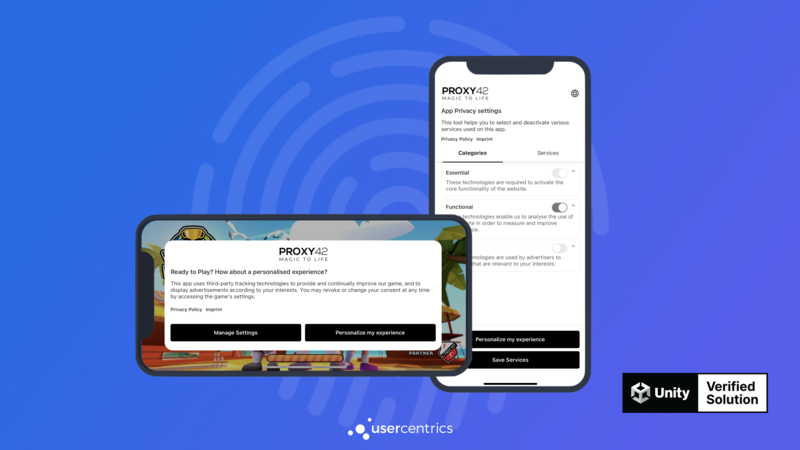As the mobile gaming industry continues to grow, developers and publishers face new challenges in monetizing mobile games to generate sustainable revenue while ensuring user privacy and data protection.
Google’s Action Mobile Genre Report reveals a shift in player sentiment towards in-game ads, with 75% reporting a positive or neutral impact. It suggests adopting a hybrid monetization strategy combining in-game ads with in-app purchases for higher revenue.
But mobile game ads don’t just benefit the developers. They also benefit the users (gamers) and advertisers, making them a popular choice for monetizing apps. And while in-game advertising is just one of the ways to monetize your game — besides in-app purchases and paid downloads —, with the Google AdMob requirements update, the game has changed for mobile game monetization.
Google’s deadline for app publishers: January 16, 2024
Google has set a deadline for mobile app publishers — including mobile games — to adopt a Google-certified Consent Management Platform (CMP) that enables privacy compliance.
Starting from January 16, 2024, Google will be making important changes to its ad serving protocols. If you have a mobile game that uses Google AdMob, you’ll be required to secure user consent via a Google-certified consent management platform (CMP) that integrates the Transparency and Consent Framework version 2.2 (TCF 2.2) developed by the International Advertising Bureau (IAB).
This is to ensure adherence to consent under GDPR requirements. The CMP serves as a bridge among publishers, users and vendors, enabling transparency with users and securely storing consent signals that can be provided to partners like Google that require them.
However, if a user does not give consent for data use, Google will drop the ad request and no ads, not even non-personalized ones, will be served. Non-personalized ads still need consent for cookies and mobile identifiers.
If you have a mobile game that uses Google AdMob and want to ensure your AdMob game’s revenue stream and stay ahead of the competition, it will be crucial to ensure your game is privacy compliant, provides great user experience, and is able to achieve optimal and continued monetization.
What is mobile game monetization?
Before we delve into the nitty gritty of AdMob for Games, let’s first understand mobile game monetization models.
As a game developer, your primary goal is to generate revenue from your game. This can be achieved through various methods, such as in-app purchases, subscriptions, or advertising. AdMob focuses on the advertising aspect and provides a platform for you to monetize your games through serving ads.
Exploring effective mobile game monetization strategies
Monetizing mobile games requires a thoughtful approach that balances revenue generation with user experience. By incorporating in-app purchases, advertisements, subscriptions, sponsorships, crowdfunding, merchandising, licensing, and data monetization, you can tap into various revenue streams while keeping players engaged.
Remember, however, that you need to understand your game’s target audience to choose the best monetization strategies that align with your game’s concept and user preferences.
In-app purchases
One of the most common monetization strategies is offering in-app purchases. This involves selling virtual goods, power-ups, customization options, or additional levels within the game. By enticing players with exclusive items or enhanced gameplay, you can generate revenue and enhance user engagement.
Ads
Incorporating ads is another effective way to monetize mobile games. You can opt for different ad formats, such as banner ads, interstitial ads, or rewarded videos. Ad revenue can be generated either through impressions or by incentivizing players to watch ads for in-game rewards.
Subscriptions
Implementing a subscription-based model can provide you a steady stream of revenue for your mobile games. By offering monthly or annual subscriptions, players gain access to exclusive content, early releases, or premium features. This model works best for games with a strong community and regular updates.
Sponsorships and brand partnerships
Forming partnerships with brands or sponsors can be a mutually beneficial strategy. You can get companies to collaborate with you to integrate their products or services within the game, providing a unique advertising opportunity. This approach works well when the brand aligns with the game’s theme or target audience.
Crowdfunding
Crowdfunding platforms offer an alternative monetization strategy for mobile games. By pitching your game concept to potential investors or the gaming community, you can secure funds to fuel the game’s development. In return, backers may receive exclusive perks or early access to the game.
Merchandising and licensing
Successful mobile games can create opportunities for merchandising and licensing deals. You can leverage your game’s popularity by selling branded merchandise, such as t-shirts, toys, or accessories. Additionally, licensing the game’s intellectual property (IP) for spin-offs, movies, or merchandise can generate substantial revenue.
Data monetization
Mobile games generate a vast amount of user data, which can be valuable for targeted advertising or market research. By anonymizing and analyzing this data, you can offer insights and reports to advertisers or research firms, creating an additional revenue stream.
So what is AdMob?
AdMob is a mobile advertising platform owned by Google. It enables you to monetize and promote their mobile and tablet apps and games by displaying a variety of ad formats — including banner ads, interstitial ads, rewarded video ads, and native ads — helping them generate revenue.
Although AdMob enables you to easily integrate ads into your game and start earning money, what you need to remember is that it’s crucial to obtain user consent in many regions that have adopted data privacy regulations when collecting personal data for targeted advertising.
The game-changing power of AdMob: What are the benefits of AdMob for game developers and mobile game studios?
Mobile game publishers are constantly searching for ways to monetize their games effectively. With the increasing privacy concerns from consumers and the complexity of privacy regulations making specific compliance requirements often unclear, finding the right solution can be challenging.
However, AdMob is here to save the day, especially for the gaming industry. AdMob for Games has the potential to revolutionize game monetization, and it’s time for you to take advantage of this opportunity. You can reap numerous benefits by implementing AdMob for your games.
1. Diverse ad formats
AdMob offers a wide range of ad formats, including banner ads, interstitial ads, rewarded video ads and native ads. You can experiment with different formats to find the ones that work best for their games and target audience.
AdMob ad formats: monetize your game
- Banner ads can be integrated into the user interface of the game, displayed at the top or bottom of the screen
- Interstitial ads can be shown at natural breaks in the gameplay, such as between levels or during loading screens
- Rewarded video ads offer players in-game rewards, such as extra lives or virtual currency in exchange for watching a video ad
- Native ads blend seamlessly with game design, providing a nonintrusive advertising experience
Effective ad formats, such as rewarded ads and interstitial ads, along with a well-designed game economy, are key for a successful mobile game monetization strategy.
2. Robust targeting and optimization features
With AdMob’s advanced targeting capabilities, you can display ads that are more relevant to your users, increasing the likelihood of engagement and conversions.
3. In-game ad revenue optimization
AdMob’s optimization algorithms help maximize the revenue generated from ads, helping ensure you get the most out of your monetization efforts.
4. Increased revenue potential
By implementing AdMob ads, you can generate additional revenue streams from your games, especially if they have a large user base. For example, implementing rewarded video ads can provide users with in-game rewards while generating revenue for the developer.
5. User engagement and retention
AdMob ads can be used strategically to enhance user engagement and retention. For instance, you can offer gamers the option to watch a rewarded video ad to unlock premium content or gain extra lives, increasing user retention and satisfaction.
6. Analytics and insights
AdMob offers detailed analytics and insights about ad performance, user engagement, and revenue generation. You can then use this data to make informed decisions about ad placement, targeting, and optimization strategies.
7. Seamless integration with Unity
Unity is one of the most popular game development platforms, and makes it easyto add AdMob ads to your Unity games and start monetizing your studio’s creations.
Read about mobile app CMP now
Games privacy: How data regulations affect game monetization
In today’s digital landscape, privacy regulations have a significant impact on game monetization. While Google Play and Apple’s App Store have their own guidelines, there is no specific government regulation targeted to mobile for game publishers to follow. However, AdMob is set to change the game for mobile game developers and publishers. By complying with AdMob’s requirements, you can continue to use Google’s monetization and marketing services.
The importance user privacy and compliance with the GDPR
Data protection and user privacy are critical considerations for any mobile game developer. On the regulatory side, in the EU, the General Data Protection Regulation (GDPR) is in effect, requiring that you obtain explicit user consent before collecting user data. But smart reasons for compliant consent collection don’t stop there.
Starting from 16th January 2024, Google will stop serving personalized ads if you don’t collect and signal consent with a Google-certified CMP. Therefore, if you have a mobile app that uses Google AdMob it will be crucial to ensure that your app is privacy-compliant to achieve optimal and continued monetization.
By implementing a Google-certified consent management platform (CMP) with the IAB’s Transparency and Consent Framework (TCF v2.2) integrated, you can ensure that your game meets the necessary privacy standards.
Get our whitepaper on Data privacy in mobile games: Why consenting users monetize mobile games better to discover the hidden benefits and low-hanging fruit of games consent.
Mobile game privacy compliance with Usercentrics In-App SDK
To implement AdMob and obtain user consent effectively, consider the platform, SDK, and features provided by Usercentrics mobile app consent management platform.
Read about mobile app consent now
Consent message for user tracking
Usercentrics App CMP offers a comprehensive solution for managing user consent in mobile games. Our platform features include customizable consent message templates, granular consent management, and the ability to obtain consent on behalf of a single user.
As a Google-certified CMP with support for iOS, Android, Flutter, React Native and Unity game engine, the Usercentrics SDK provides a flexible approach to solving data privacy compliance for mobile games. Integrate it into your game in less than an hour. Plus, Usercentrics Apps CMP supports Google Consent Mode and is also TCF-certified.
Unity games compliance with Usercentrics Unity SDK

The Usercentrics Unity SDK helps you comply with the latest Google requirements, TCF 2.2 compliance standards, and privacy laws like the GDPR and the Digital Markets Act (DMA) in the EU and CCPA in California. Our intuitive drag and drop integration enables compliance out of the box, furnishing you with our entire suite of optimization and analytics features. This not only enhances your monetization and retention performance but also helps to ensure you adhere to the DMA law requirements and other necessary privacy regulations.
Get started by creating your account or download our Unity Package to see a demo.
Mobile game monetization success story: How Homa Games achieved 10% increase in ad LTV via user consent
When faced with the challenge of integrating user consent into their popular app game, Tape Thrower, while maintaining user engagement, Homa Games turned to Usercentrics Consent Management SDK. By integrating this consent management solution, Homa Games unlocked ad network inventory in regulated regions, resulting in a 10% increase in ad LTV, all while ensuring gamers’ privacy was upheld in accordance with local regulations.
The implementation of Usercentrics’ solution has not only enhanced Homa Games’ monetization efforts but also provided clearer information to their users about data privacy and use and their consent options – fundamentals in consent marketing. The success of this integration has the team at Homa considering additional implementations of the Consent Management SDK into games in their portfolio, aiming to further increase monetization and avoid potential privacy fines
Conclusion: Level up your mobile game monetization strategies with AdMob
Game app monetization is a complex process, especially in the context of regulatory compliance and user consent. However, with AdMob, you can navigate these challenges and increase your game’s revenue while respecting user privacy.
By leveraging AdMob’s advertising capabilities and implementing a Consent Management SDK like Usercentrics, you can maximize your game’s revenue potential while continuing to deliver great experiences to users.
Remember, Google’s January 2024 deadline is fast approaching, so if you’re a game developer or mobile gaming company looking to monetize your games in the EU, it’s essential to act now. Consider integrating AdMob and implementing a consent management solution to enable and signal your privacy compliance. Level up your game’s monetization strategy and create a win-win situation for both your users and your business.




